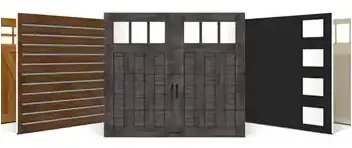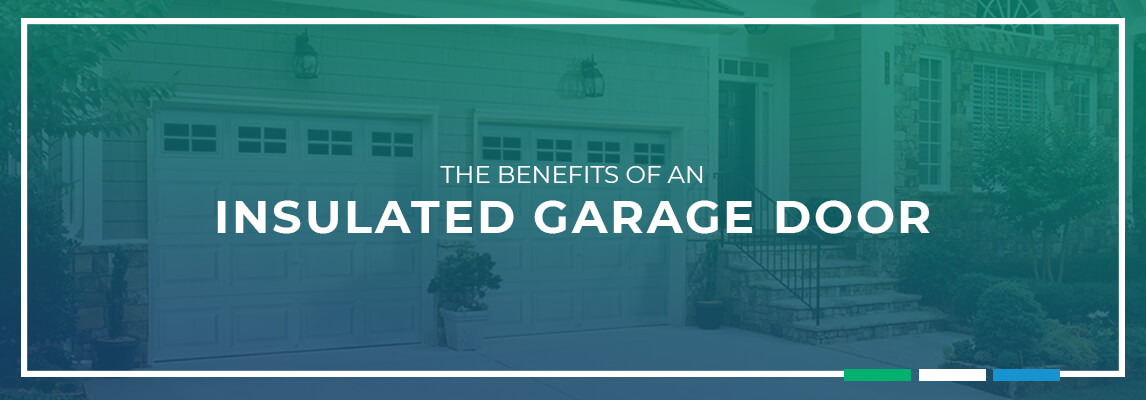
These days, garages serve many purposes in addition to storing vehicles. For many, the garage door is the primary way they leave and enter their homes. Some use their garages as a workshop, rec room or craft space, and most Americans use it for storage.
A second deep-freezer, some leftover paint cans and the family’s extra water jugs are other everyday items we store in our garages, yet sometimes people are surprised to learn that their things would be much better protected if their garage door was insulated.
Table of Contents
- What You Need to Know About Garages and Insulation
- How Does Your Garage Door Affect Insulation Inside Your Garage?
- How Insulating a Garage Door Works
- How Are Insulated Garage Doors Different From Non-Insulated Ones?
- What Are the Benefits of an Insulated Garage Door?
- How to Measure If An Insulated Garage Door Is Worth It
- How Can You Get Started on Insulating Your Garage Door?
What You Need to Know About Garages and Insulation
Technically, garages aren’t considered living spaces, so construction regulations on creating a safe, sealed environment are much looser. Air leaks through the cracks, both into the garage and out of it, bringing the garage close to outdoor temperatures. Depending on where you live, these temperatures can make the garage unbearable to spend any time in, cause damage to stored belongings and drive up the cost to balance the heat or air conditioning within the house.
Cold climates and warm climates alike can affect the comfort and energy-efficiency of any home. Insulating your garage door is perhaps the most effective way to control your garage temperatures and reap the rewards of a tightly-sealed garage space. There is a big difference between garage doors that are insulated and those that are not. Once you see how you could benefit from an insulated garage, even with the temperatures we experience here in West Central Florida, you’ll never turn back.
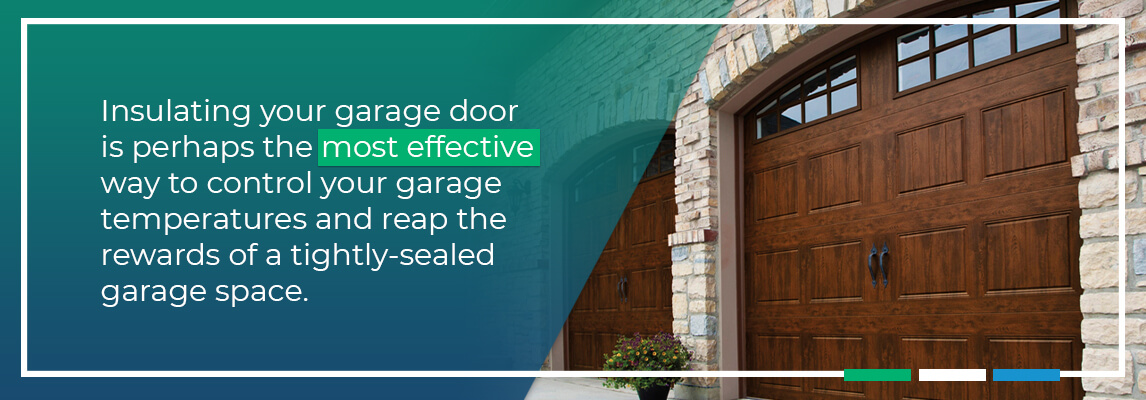
How Does Your Garage Door Affect Insulation Inside Your Garage?
For the most part, garage doors have the primary function of sealing your garage to create a shaded, sheltered space to store your vehicles and belongings. If garage doors, in general, are designed to keep the elements outside, then how do insulated garage doors make a difference?
You may think most garage doors are mostly the same in their ability to block out extreme heat or cold, but two main garage door characteristics can change the insulating effect your garage door can have.
1. Construction Layers
The number of layers your garage door has helps determine how well it insulates your garage. There are three types of garage door construction:
- Single Layer: Also referred to as non-insulated garage doors, these garage doors are made up of only one layer of panel material with no added insulation.
- Double Layer: Along with the layer that makes up the exterior door, you have a sheet of insulation on the interior — usually a polystyrene-based layer.
- Triple Layer: As the most insulating, these doors have a much thicker layer of insulation made of either polyurethane or polystyrene, packed between two sheets of garage door material.
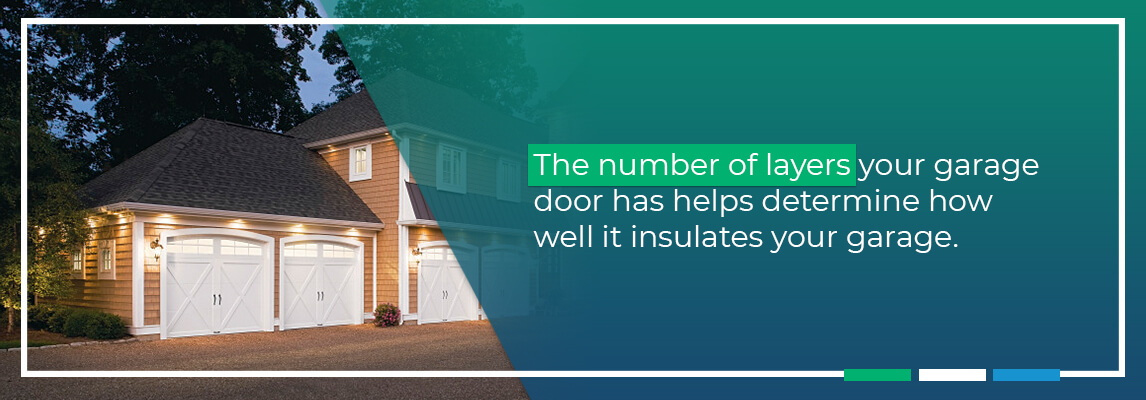
With a double layer or triple layer door, you will find the material of your door is much more of an aesthetic choice rather than an insulation-related one. If you opt not to have added insulation, the type of garage door material will make a big difference regarding how well-insulated your garage will be.
2. Garage Door Materials
Garage doors are typically made of primarily one of the following five materials. While you can enhance any of them by attaching layers of insulation, each has different characteristics that determine their durability and insulating power on their own. These materials include:
- Steel: As the most common material for modern garage doors, steel is durable and low-maintenance. It is much less likely to get damaged from anything scraping or bumping against it, and it offers a lot of design varieties. Steel is the ideal skin for wrapping around vinyl or foam insulation layers for double and triple layer garage doors, and even on its own, a single steel layer can add a moderate amount of insulation.
- Aluminum: Lightweight and sleek, aluminum garage doors give your home an updated look. It’s much less heavy-duty than steel, making it a poor insulator due to how thin it is.
- Glass: No garage door is entirely made of glass, but glass can be the main component of a garage door if it’s made of giant windows within a metal frame, such as the garage doors you have seen used in firetruck garages. Similar to aluminum, glass is thin, so it insulates quite poorly. Acrylic is a cheaper alternative to glass windows, but it also allows a lot of heat or cold to enter in.
- Wood: For a classic, high-end visual appeal, homeowners can choose a wood garage door.
- Composite Wood: On its own, composite wood is not a good insulator, but it can sometimes serve as an outer decorative layer on double or triple layer steel garage doors. This layering allows homeowners to achieve that classic look while also taking advantage of better insulation.
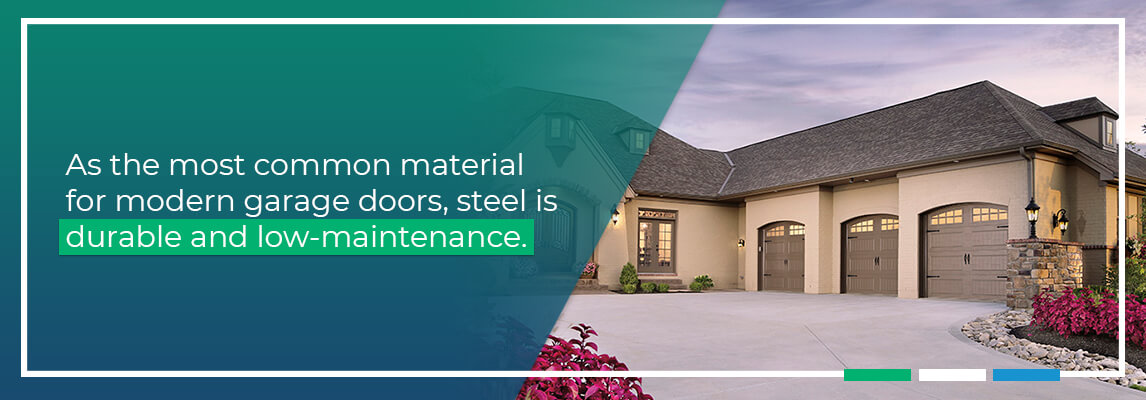
You may be surprised to learn how much variety there is among garage door efficiency. A single layer door will only be as durable and energy efficient as the material it is made out of. But with more layers, more insulation is possible.
How Insulating a Garage Door Works
There are several strategies for creating better insulation for your garage. Caulking leaks between the fame and foundation around your garage door and windows can help, but the best way to improve the insulation is by doubling up on your garage door layers. With double or triple layer garage doors, there are two primary methods for adding insulation that come down to the material used:
- Polystyrene Insulation: This method involves placing a stiff board of padding along the inside of the garage door to add a thick layer of insulation. The polystyrene sits flush against the outer garage door layer, and it isn’t typically sealed in the way that injected polyurethane insulation is. This makes it the less expensive option of the two.
- Polyurethane Insulation: We call this the sandwich door, since it involves injecting a layer of insulation foam between two layers of the garage door. This foam binds to the wood or steel of the door like a thick glue, creating a robust and rigid structure. It provides about twice the R-value — a measurement professionals use to determine insulating power — compared to polystyrene.
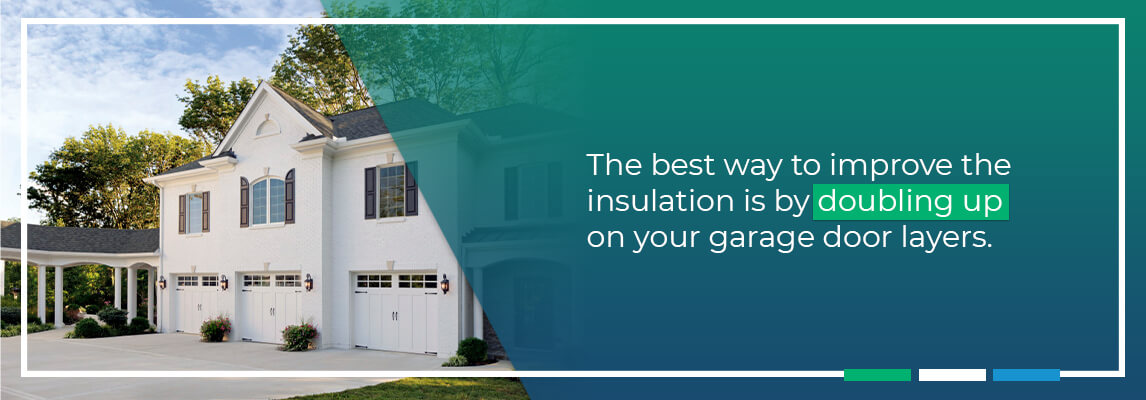
Both of these options create greater garage door durability and insulating power. The most effective garage door regarding insulation is a triple layer door using polyurethane foam, such as Banko’s Clopay® garage doors featuring proprietary insulation technology for the top level of protection and strength.
How Are Insulated Garage Doors Different From Non-Insulated Ones?
From the outside, insulated and non-insulated garage doors are hard to tell apart, which might lead you to believe that apart from thickness, there’s no discernable difference between the two. The distinctions become much clearer once we address some of the disadvantages to having only a single thin layer between your garage and the outside world.
- Garage Temperature: Depending on the insulation of your garage door, heat from outside during sweltering summer months or frigid air if you live in a colder climate can seep through the gaps and into your garage. Not only does this affect whether you want to store specific items in your garage, but it can cause instability to your home’s temperature, as the air from your garage leaks into the house.
- Noise Effect: Single-layer panels on non-insulated garage doors often rattle and quake every time you open or close them. They can also create loud reverberations if daily activities cause someone or something to bump into them. Additionally, if your garage is not well-insulated, the thinness of a single layer garage door can mean any activities you may want to enjoy in the garage will be easily heard outside, and vice versa.
- Sturdiness: Thin, non-insulated garage doors will be much more likely to suffer permanent dents and damages if there is any collision against them like basketballs, bikes or even hail. If you live in an area with heavy storms, such as hurricanes or hail storms, a non-insulated garage door may do your home more harm than good, since it will be less capable of standing firm in rough winds to protect your belongings.
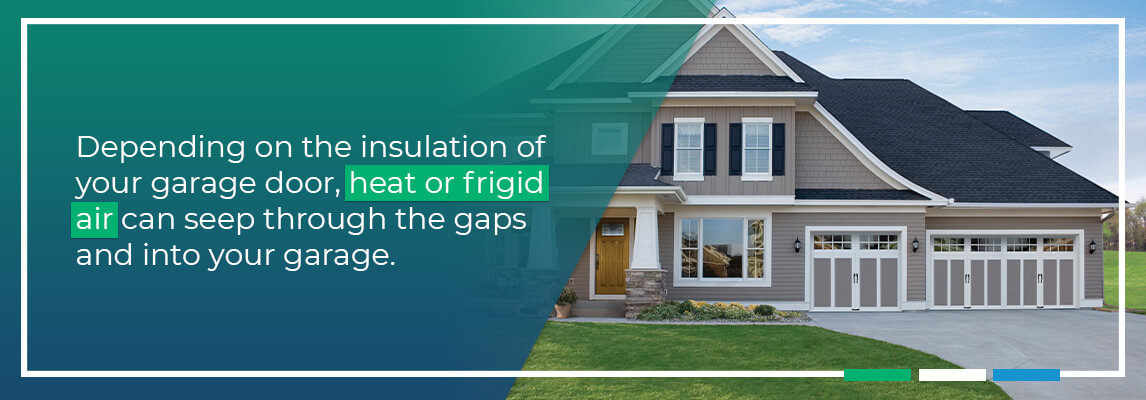
As you can probably imagine, these downsides to non-insulated garage doors mean there are considerable benefits to installing an insulated garage door for your home. Not only are these downsides no longer an issue, but you will find there are some extra perks and financial savings involved in the long run if you decide to insulate your garage door.
What Are the Benefits of an Insulated Garage Door?
While we’ve already addressed a few perks of having an insulated garage door, here is a breakdown of some of our favorite reasons everyone — even residents in warmer climates — should consider adequately insulating their garage. If you aren’t yet convinced about why insulated garage doors are helpful and necessary, perhaps the following six benefits can shed some more light.
1. Money Savings
It pays to be energy-efficient. Switching to an insulated garage door can make a desirable difference in the energy bill you see every month. Why is this? It’s all about what is known as the thermal boundary garages create, a sort of buffer against outdoor temperatures.
Most people air condition and heat their homes, and some even do the same in their garages if they spend a lot of time in them. The problem with non-insulated garages is that you’ll be waging a constant battle with the temperatures of Mother Nature as they slip through the gaps, driving up your electricity and gas bills immensely. Leaks around the frame and windows and the thinness of aluminum doors are often the most significant causes for this kind of loss.
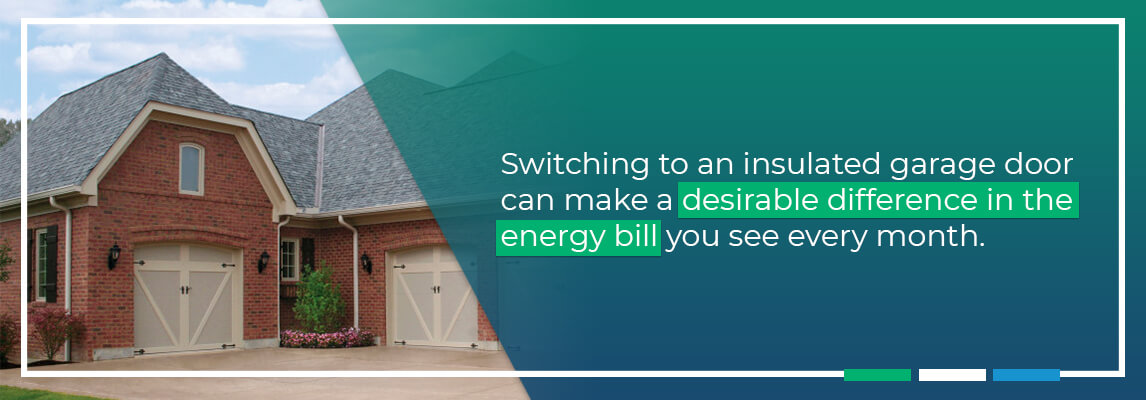
Other strategies that can help your garage be even more energy efficient include adding insulation to your garage walls since garages sometimes are less protected than the rest of the house. Find gaps between the foundation and the frame and caulk them over to prevent air flow.
2. Increased Comfort
If you avoid letting the extreme cold or warm temperatures seep into your garage, then you’ll be much better equipped to keep them from infiltrating the rest of your home, too. You don’t want your family to suffer from the heat of summer unnecessarily or have to bundle up in your home just because too much outdoor air is seeping in through the garage.
Every time you enter your garage through your home, you let the air mix between the two parts of the house. Despite how much we’d like to control it, that sort of temperature exchange is likely to happen through the door to your garage anyway. The best way to keep a sturdy grip on your home’s temperatures is to prevent your garage itself from being in the uncomfortable temperature zone.

3. Better Protection
Your car and other belongings you store in your garage can receive damage over time if they are not adequately protected from outside temperatures. Cars can have issues starting due to dying batteries if they remain in freezing temperatures for too long. Not to mention, your tires can lose their air pressure, and car fluids can thicken and lose reliability.
In warmer climates, cardboard boxes and paint cans can wilt and rot since lower insulation often also means less control over the moisture levels in your garage. An insulated garage door helps you manage the temperatures your belongings are exposed to on a regular basis. It also prevents a lot of other undesirable substances like mold and mildew from building up over time. The chemicals we tend to keep in our garages will also be much better protected if you can keep their temperatures regulated.
Another way you can protect your belongings through better insulation is by guarding against pest infestations. With significant gaps between the garage door and the frame sealed in tightly, rodents and insects will be much less likely to find their way through. You’ll be providing as few opportunities as possible for critters to slip inside during the night or when it’s raining, which will help the whole family rest just a little bit easier.
4. More Noise Control
For some people, an insulated garage door is worth it merely for the fact that it will help reduce the amount of noise that comes into the house from outside the garage. If there are too many gaps and leaks around your garage door — or if your garage door is made out of a thin, single layer — it’s not only the air that creeps in, but it’s also all of the sounds from the outdoors.
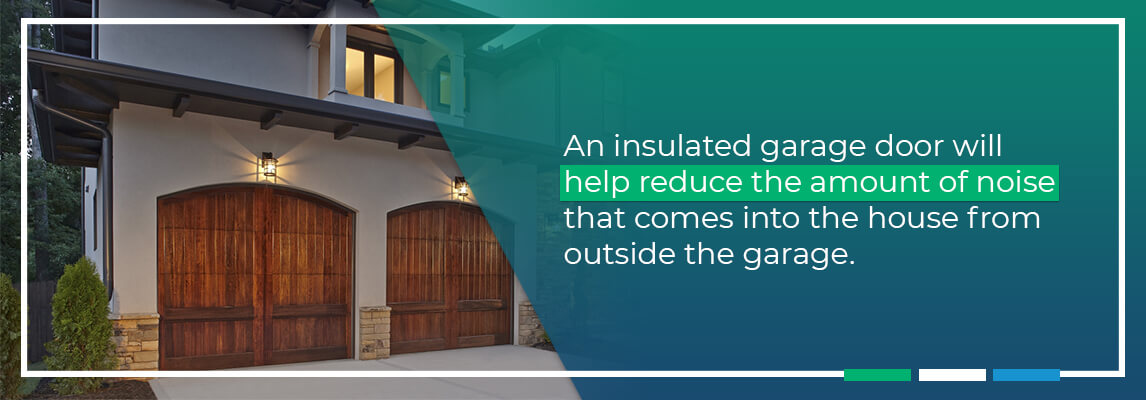
Keeping the noise of traffic or neighborhood events from creeping into your home through your garage can be a massive benefit of a well-insulated garage. A sound barrier like this will be quite the luxury, especially if you like to spend time in rooms directly adjacent to or above the garage, where you’re most likely to be interrupted by outside noises.
Insulating your garage can also help the noise of opening and lowering your garage door go unnoticed by the neighbors and members of your household. Other ways you’ll be able to use this perk to your advantage include keeping easily-disturbed neighbors off your back if you, for example, have a workshop with lots of loud tools, work out in your garage while listening to loud music or even host regular rock band practice in your garage. The better insulation keeps the noise you make in your garage well-contained, too.
5. Improved Durability
You would probably be surprised to hear how much abuse garage doors typically endure, whether from bad weather or even the wear and tear of constant raising and lowering. Projectiles in the wind can also come at your garage door at any time, causing dents and scratches.
Adding insulation provides your garage door with the thickness and rigidity it will need to withstand specific impacts. The more controlled temperatures within your garage can further protect the mechanisms from warping metal components, eroding lubrication and inducing stress on the springs, thus vastly prolonging the lifespan of your garage door.
6. Enhanced Curb Appeal
As a homeowner, you’re probably thinking long-term about the investment you make in your home for the sake of improving its re-sell value. We’re proud to tell you garage door replacements and renovations are among the top best investments you can make, offering a 98 percent return nationwide. This statistic makes your garage door decision an incredibly valuable one, especially if you get to enjoy all the other benefits between now and when you decide to sell your house.
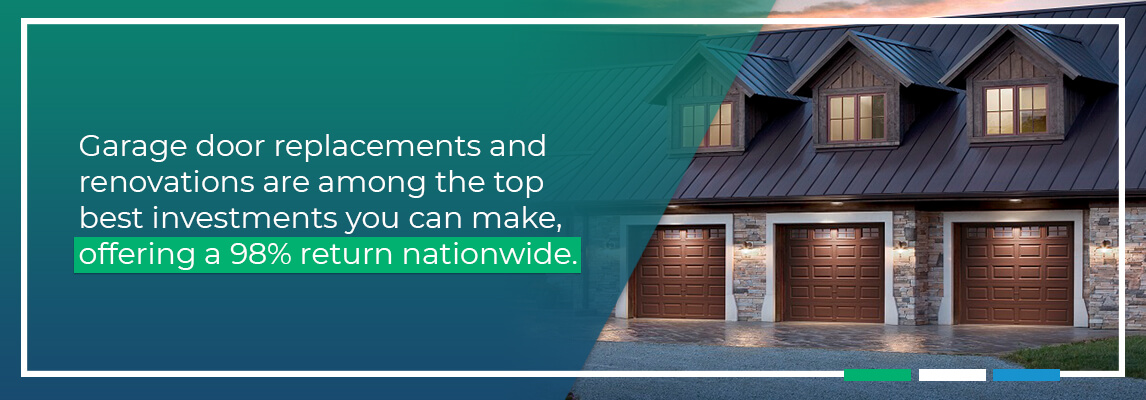
Obviously, the look of a new garage door is the main reason the curb appeal of your home improves, but in addition to choosing aesthetic materials, you want to consider insulation. Thanks to the durability benefit listed above, insulation adds a prolonged beautifying effect. Preventing dents and dings from daily activities will help keep your garage door looking brand new for longer, enhancing the overall exterior beauty of your home.
How to Measure If an Insulated Garage Door Is Worth It
The best way to determine if an insulated garage door is right for you is to ask yourself a series of questions. Is your garage attached to your home? Do you park your car inside it during times of extremely hot or cold temperatures? Do you store other items inside your garage that could suffer in these temperatures? Do you have rooms above your garage that severe temperatures in the garage could affect? Answering yes to any of these might be a reason to consider making the switch.
If you already love the exterior of your single-layer garage door, adding insulation to the interior of the garage door will not have any effect on the outside look, so you’ll be able to enjoy insulated garage door benefits without having to adjust for a brand-new style or material for your garage door.
All in all, are insulated garage doors worth it? The list of benefits ranging from better finances to more comfortable feel for your home reflects a resounding “Yes!” in our book. With the reduced noise and more appealing look of your garage door, you’ll never regret making the switch to an energy-efficient garage door.
How Can You Get Started on Insulating Your Garage Door?
Bank on the best with Bank Overhead Doors in the Tampa Bay and surrounding communities. With our rapid response times and zero hidden costs, we’ll show you the vast selection of styles we offer and help you make the smartest choice possible.
We are proud to offer Clopay Insulated Garage Doors featuring Intellicore Insulation technology.
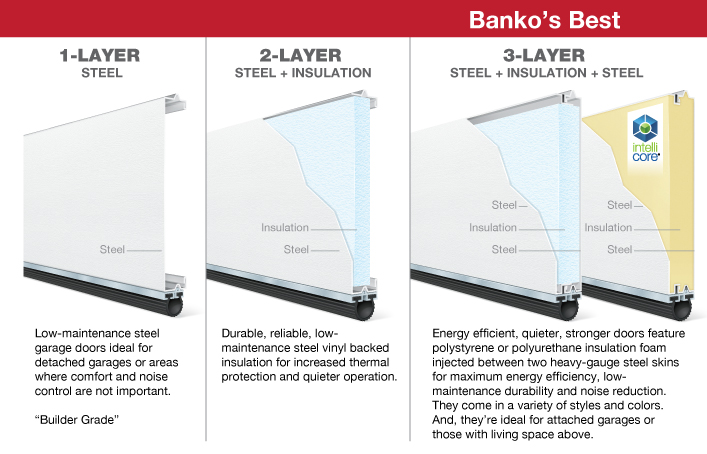
Garage door installation is a smart choice for residents in West Central Florida. Contact us today for a free installation estimate, and you’ll be well on your way to creating a more energy-efficient home and enjoying the benefits of a stronger, quieter and longer-lasting insulated garage door.
Additional Resources on Garage Door Insulation:










